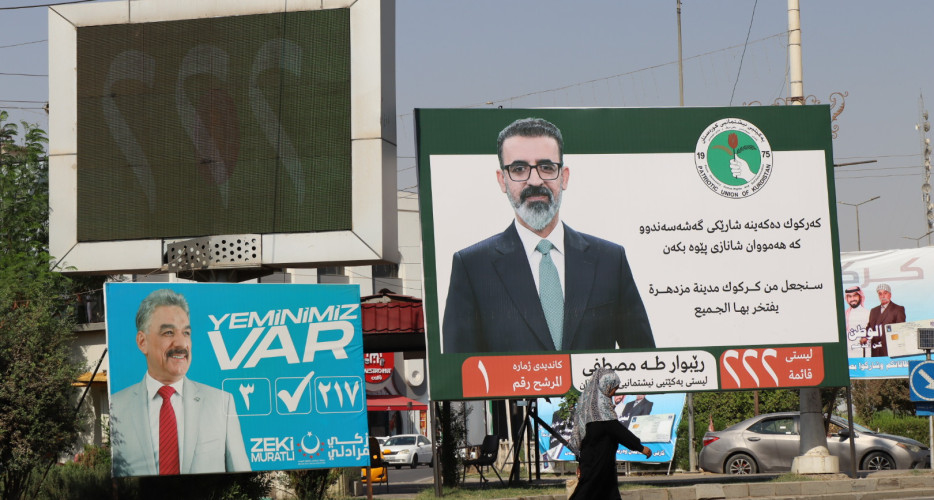Kurdish Setback in Disputed Territories Due to Multiple Candidate Lists and Competition Over Minority Seats

Peregraf - In the Kurdish Disputed areas outside the administration of the Kurdistan Region, Kurds secured more than 550,000 votes and 13 seats in the Iraqi Parliament. However, low voter turnout and competition over minority quota seats resulted in the loss of Kurdish seats in these areas, particularly in Kirkuk, Salah al-Din, and Diyala, where three to four guaranteed seats were lost.
In the four electoral districts of Kirkuk, Nineveh, Diyala, and Salah al-Din, which encompass Kurdish areas, Kurds participated with three lists in some districts and five in others, obtaining a total of 556,463 votes and 13 seats. In Kirkuk, they won 5 seats; in Nineveh, 7 seats; in Diyala, 1 seat; however, in Salah al-Din, they did not secure any seats.
The Kurdistan Democratic Party (KDP), the Patriotic Union of Kurdistan (PUK), New Generation Movement, the People's Front, and the Kurdistan Social Democratic Party fielded lists in the disputed territories, along with an independent Kurdish candidate in Kirkuk. However, the Stance Movement, the Islamic Union, and the Justice Community did not present lists in these areas. Consequently, aside from the KDP and PUK, no other party was able to secure seats.
Although the PUK obtained 20,000 more votes than the KDP overall in the Kurdish areas outside the Kurdistan Region, due to the distribution pattern of votes, it secured two fewer seats than the KDP.
Kirkuk Province
Kurdish parties in Kirkuk participated with five lists and obtained 253,125 votes and 5 seats.
Due to the proliferation of candidate lists, Kurds in Kirkuk lost one to two seats. For the first time, Kurds won fewer than half of the available seats, securing 5 seats, while Arab communities obtained 5 seats and Turkmen secured 2 seats.
The candidate Emad Yokhanna, supported by the KDP, won the Christian quota seat in Kirkuk with 17,602 votes, whereas Duraid Jamil, supported by the PUK, received 12,820 votes and was unsuccessful.
These two Christian candidates in Kirkuk, over whom the KDP and PUK competed, garnered a combined 30,422 votes. Electoral organizations and observers estimate that approximately 25,000 of these votes belonged to the KDP and PUK, while the actual votes of the candidates themselves amounted to five to six thousand.
Although not all votes cast for minority candidates originated from Kirkuk—as voting for these candidates constituted a single district and votes could be cast from throughout Iraq—the overt competition between the KDP and PUK over these two Kirkuk candidates demonstrates that their votes were mobilized by the organizational structures of these two parties from the Kurdistan Region's provinces and Kirkuk Province itself.
Apart from the KDP and PUK, New Generation in Kirkuk obtained 12,320 votes, the People's Front 1,702 votes, the Social Democratic Party 791 votes, and an independent Kurdish candidate 389 votes, none of which secured seats. Thus, 15,202 Kurdish votes were wasted.
The competition over minority seats and the votes of parties that did not secure seats resulted in the waste of thousands of Kurdish votes in Kirkuk. With those votes, Kurds could have secured one to two additional guaranteed seats, as the KDP required fewer than five thousand votes to win a second seat, and the PUK needed fewer than 14,000 votes for a fifth seat.
Salah al-Din Province
In Salah al-Din, Kurds had no independent list; only the KDP and PUK fielded two candidates on two separate lists, obtaining 16,942 votes.
In Salah al-Din Province, where the PUK previously held a parliamentary seat, its candidate in this election ran within the Jamahir Wataniya list and received the second-highest vote count for that list but was unable to secure a seat due to the women's quota seat.
Karim Shukur, the sole PUK candidate in the Salah al-Din district, ran within the Jamahir Wataniya list and obtained 14,843 votes. However, because a women's quota seat was allocated to the list, Karim Shukur did not win a seat.
The KDP had only one candidate in the Salah al-Din district within the Azm Alliance, named Shaima Mahmoud Ali, who obtained only 2,099 votes and was unsuccessful.
There is a possibility that the successful candidate from the Jamahir Wataniya list, Badr Mahmoud, the Governor of Salah al-Din, may not enter Parliament. In that event, the PUK candidate would assume the seat.
Diyala District
In Diyala, Kurds participated with four different lists and obtained a total of 38,950 votes.
In Diyala Province, which includes Khanaqin District, the KDP won a women's quota seat for the first time in twenty years of elections with fewer than 8,000 votes. However, the PUK, despite having more than 29,000 votes, was unable to secure a seat. Also in Diyala, New Generation obtained 1,552 votes and the Social Democratic Party 433 votes.
The final seat in the Diyala district was won by the Sabitoon list with 30,412 votes, a difference of 1,368 votes from the PUK, which received 29,044 votes. Had the PUK, New Generation, and the Social Democratic Party formed a unified list, another Kurdish seat in Diyala would have been secured.
Nineveh Province
In Nineveh Province, Kurds participated in the election with three lists and obtained 247,446 votes.
In Nineveh Province, the Kurdistan Democratic Party obtained 189,120 votes and won five seats. The PUK participated within the framework of the Ittihad Ahl Ninawa list, which obtained 56,346 votes, and the PUK secured two seats. New Generation obtained 1,980 votes and did not win any seats.
Two New Seats for Kurds
For the first time in twenty years, the PUK won a seat in Baghdad and the KDP won a quota seat in Wasit Province.
Ayat Adham, a female PUK candidate on Mohammed Shia al-Sudani's list in Baghdad, successfully secured a parliamentary seat.
A Faili Kurdish candidate in Wasit Province, supported by the KDP and endorsed by Masoud Barzani himself, achieved victory.